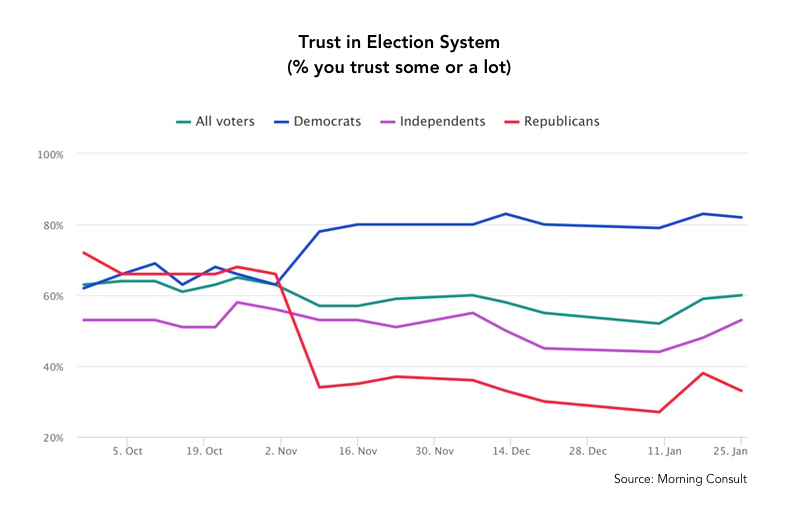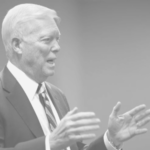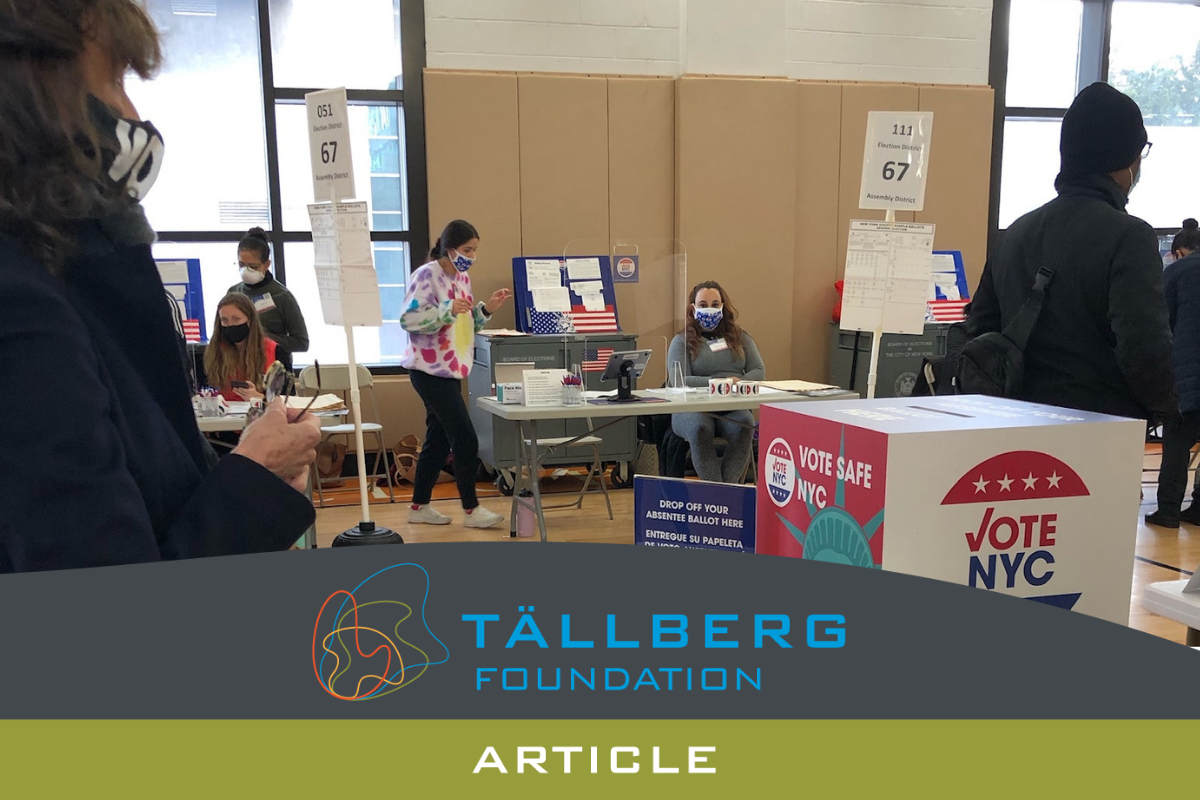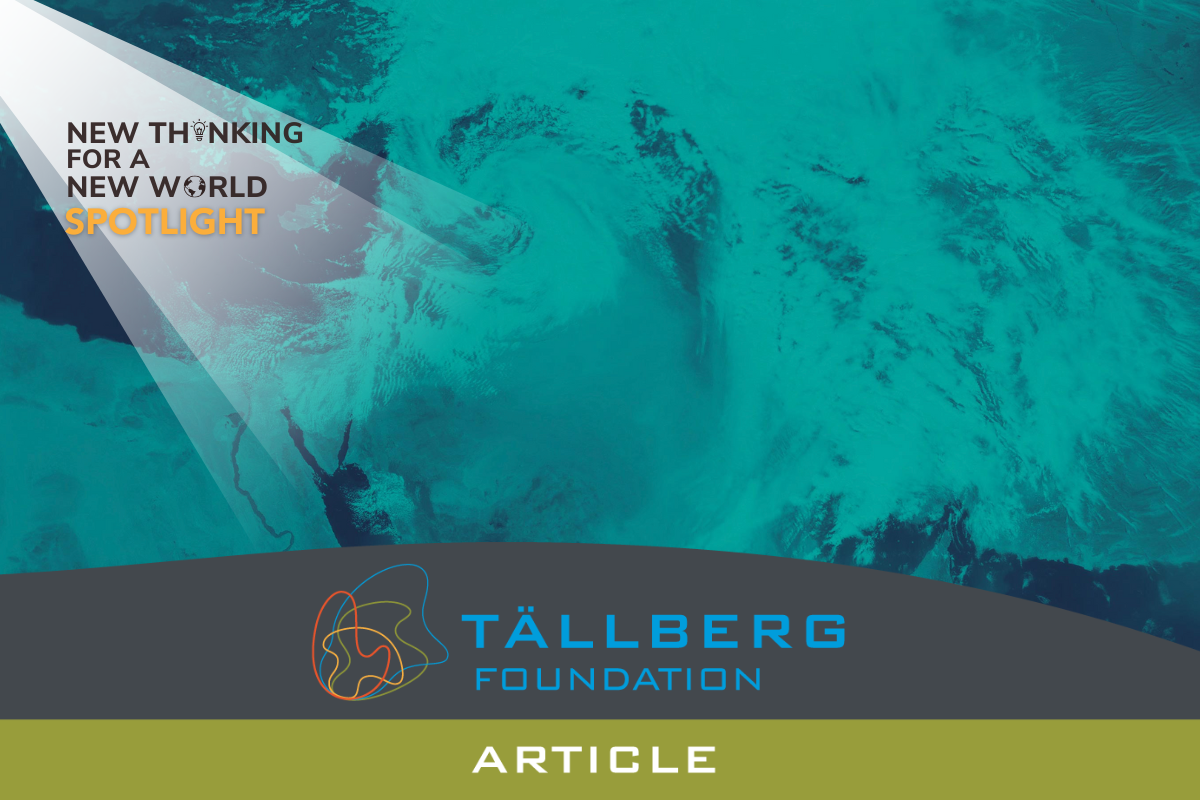Dick Gephardt is a democrat; he firmly believes that democracy is the best form of government and spent almost four decades in public office in America trying to make it work. He is also a Democrat who rose to be Majority as well as Minority leader in the U.S. House of Representatives, was a two-time candidate for his party’s presidential nomination, and is still influential in American politics.
Today, however, what he is most of all is worried. Worried that hate, misinformation and extreme partisanship have pushed the United States to a dangerous place. Worried that, without profound changes, the political system could break. “I think we’re now at a tipping point in our democracy,” he declared in a recent New Thinking for a New World conversation with Tällberg’s Alan Stoga.
The mob that stormed the U.S. Capitol on January 6 proved something that Gephardt has long believed: “democracy is a substitute for violence.” He points out that America’s history is replete with violent political episodes: assassinations, duels, riots, fistfights, even a “caning” on the floor of the Congress. But he offers that history neither as an excuse nor as an explanation, but to insist that successful democracy demands hard work. He insists that it requires a deep commitment to process, and that it is more about losing than winning. “The majesty of democracy is that the losing side…is willing to grudgingly put up with the result because they believe it was fair—or fair enough—and that their voice was heard. They just didn’t win on that vote; they will have a chance another day to turn it around.”
And that’s the problem, he says. Americans have lost much of their trust in the basic fairness of the political system; they no longer believe that if they lose today, they will have a fair chance to win tomorrow. Why? Gephardt argues this is partly because people are hurting due to the lingering, traumatic impacts of the Great Recession of 2008 as well as the ongoing transformation from an industrial economy to an information economy that has damaged “a lot of people’s economics, their way of life and their standards of living.”
 But, for Gephardt, the main issue is the decades-long evolution of the information system that surrounds and informs politics. Now we have “a culture where we have little or no shared facts among people.” Indeed, he says, “If there are no shared facts in the country, I don’t know how you have a democracy.”
But, for Gephardt, the main issue is the decades-long evolution of the information system that surrounds and informs politics. Now we have “a culture where we have little or no shared facts among people.” Indeed, he says, “If there are no shared facts in the country, I don’t know how you have a democracy.”
In Gephardt’s telling, this started with the introduction of negative ads in political campaigns during the 1980’s; worsened when Roger Ailes introduced a new kind of right-wing, fact-light television journalism at Fox News that was then imitated on the left; and was capped by the emergence of social media platforms that allow people to self-isolate in information bubbles defined only by what they already know. “When you look at the information culture that has been created, you can quickly and easily understand how people believe what their tribal leaders are telling them to believe,” Gephardt says. People “cannot accept contrary information. They don’t want to hear it. They don’t want to know about it. They won’t accept it. They think it’s false. They think all of the media is corrupt; they think all politicians are corrupt.”
Gephardt deeply believes America’s future turns on changing that reality: “You can’t have a healthy democracy without healthy information.” The challenge is to “get out of these information bubbles and…encourage people…to stop hating one another, to start respecting one another.”
How to do that? First, “we used to have a fairness doctrine for the TV industry, requiring them…to put on opposing views to whatever views they were putting out.” Something like that should be reinstated, he thinks. Second, social media companies “should be held to some standards…of what is mostly true information and what is mostly untrue information.” While the sheer volume of social media posts makes this difficult and free speech must be protected, some kind of “umpire” needs to be created. Third, people need to be educated to become “more intelligent, effective consumers of information.” But even as he ticks off these initiatives, Gephardt recognizes the magnitude of the problem: “There is no silver bullet.”
In one sense, Congress and politicians aren’t the problem. “It’s very hard for the Congress to be other than a reflection of the American people. That’s their job…So if the public in their district is hating anybody on the other side and does not want to compromise on any issue that they care about with the other side, …it’s very hard to begin to believe that Congress can go back to the way it was and the way it should be of being able to bring about compromises on complicated controversial issues.”
On the other hand, Gephardt believes that politicians should not run for office simply to be in office; they should run to make positive changes for their constituents and the country. “You are elected to be a leader, to use your judgment, to make the best decisions you can make for the people you represent and for the whole country,” he says. “Your job is to lead the people. And if you get unelected because of it, then fine. That’s okay. That’s part of the deal.” Whether or not most politicians today agree is a different—but very important—question.
Despite the chaos of the last months—the painful departure of President Trump, his effort to overturn the election outcome, the January 6th riot, Trump’s second impeachment and looming Senate trial—Gephardt retains a fundamental optimism that the United States will find a way forward.
“My firm belief is that the American people in a great majority are really good. They’re not perfect. Everybody makes mistakes, everybody fails, but they want the right things. They believe in the values of this country…They believe in the rule of law. They understand that you can’t have capitalism without the rule of law, without democracy.”
Is that enough? “I think the young people in the country today really get this. I’m not altogether sure how they got it, but they got it. We just need to keep on keeping on.”
Richard Gephardt recently spoke with Alan Stoga as part of the Tällberg Foundation’s “New Thinking for a New World” podcast series. Hear their whole conversation here or find us on a podcast platform of your choice (iTunes, Spotify, Acast, Stitcher, Libsyn, etc).
ABOUT OUR GUEST
 Richard Gephardt served for 28 years in the United States House of Representatives, from 1977 to 2005, representing Missouri’s 3rd Congressional District. He served as House Democratic Leader for more than 14 years, as House Majority Leader from 1989 to 1995, and Minority Leader from 1995 to 2003. In his role as Leader, Mr. Gephardt emerged as one of the leading strategists of the Democratic Party’s platform and chief architect to landmark reforms in healthcare, pensions, education, energy independence and trade policy.
Richard Gephardt served for 28 years in the United States House of Representatives, from 1977 to 2005, representing Missouri’s 3rd Congressional District. He served as House Democratic Leader for more than 14 years, as House Majority Leader from 1989 to 1995, and Minority Leader from 1995 to 2003. In his role as Leader, Mr. Gephardt emerged as one of the leading strategists of the Democratic Party’s platform and chief architect to landmark reforms in healthcare, pensions, education, energy independence and trade policy.
Mr. Gephardt is President and CEO of Gephardt Government Affairs, serves on public and private sector boards of directors and is the founder of the Gephardt Institute for Civic and Community Engagement at Washington University in St. Louis. Widely known for his advocacy for international human rights, Mr. Gephardt served as Chairman of the National Endowment for Democracy, a private, nonprofit organization that endeavors to strengthen democratic institutions around the world through nongovernmental efforts, from 2009 to 2013.
During 2020, Mr. Gephardt actively worked to prevent an array of threats to the integrity of the election and transition through an organization he helped create: Keep our Republic.





Great post – no words. Thank.
Nice blog, but worth adding more information
“Americans have lost much of their trust in the basic fairness of the political system; they no longer believe that if they lose today, they will have a fair chance to win tomorrow. Why? Gephardt argues this is partly because people are hurting due to the lingering, traumatic impacts of the Great Recession of 2008 as well as the ongoing transformation from an industrial economy to an information economy that has damaged “a lot of people’s economics, their way of life and their standards of living.”
Excellent article and agree with the above.
Would like to add that governments & corporates are struggling to embrace the rapid transformation brought about by the fourth industrial revolution, and are using marginalized communities such as refugees & migrants as scapegoats for this.
September 11, 2001 planted the seed of fear towards Muslims, resulting in propaganda in in the West in 2015 when thousands of refugees came to Europe in the hope to create a better life for themselves and their families.